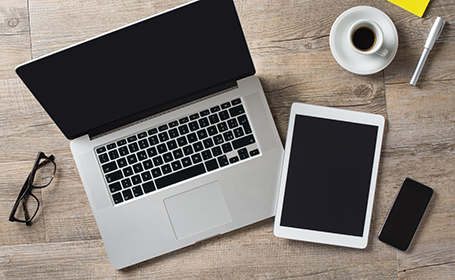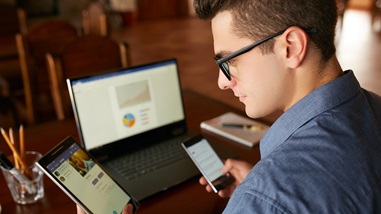
Modern technology and mental health
Can smartphones and social media encourage symptoms of anxiety and depression? We take a closer look and offer advice on how to step away from your screen
Whether we like it or not, technology has an increasing role in our lives. And while many aspects of modern technology are amazing, access to a 24/7 society can take its toll.
Studies by The National Library of Medicine have shown that for some people, being constantly connected can cause psychological issues such as expectation of instant gratification, distraction, narcissism, sleep issues, stress, even anxiety and depression.
Hands up if you find yourself worrying over not getting a prompt reply to your latest WhatsApp or text message? Or are you constantly checking Facebook, Instagram or Snapchat to see what your friends are up to and how many likes your last post received?
The impact of technology on your health

How does social media affect mental health statistics? Many studies and mental health articles published by The National Library of Medicine have shown a link between high use of social media and symptoms of anxiety and depression.
Other studies have linked increased screen time (not only social media) to negative effects on mental health.
However, studies by the Mental Health Foundation have shown that opinions are divided and more research is needed before we can reach a definitive answer.
Still, I find that more and more people are coming to me with symptoms related to their use of technology. I have found that there are a few common ways in which it can affect people's mental wellbeing.
If you misread a person's feelings or take something out of context, or if someone does the same to you, it can make you feel anxious.
If you're thinking and worrying excessively about what you've written or who has or hasn't liked or commented on your post, this can lead to anxiety.
There is also the fact that social media can become a platform for various forms of disrespect, which can lead to low self-esteem, low confidence, anxiety and depression.
Impulsivity and impatience
When we post online, for example to Facebook, it reinforces our need for instant, approving feedback.
This doesn't happen in the real world, consequently we become more inpatient, frustrated and anxious.
If you sleep with your phone nearby, subconsciously you are expecting a message... so your sleep will be lighter.

Sleep issues
In my clinic, I see many people with sleep issues where during our consultation it becomes apparent that technology has a role in their distress.
If you sleep with your phone nearby, subconsciously you are expecting a message, be it a text or Facebook notification, so your sleep will be lighter. This causes hypervigilance, which is where you are feeling alert, tense and on guard while you should be sleeping.
The light that is emitted from phones can also be problematic because it interferes with your body's natural sleep/wake cycle and supresses the production of the sleep hormone melatonin. This convinces your body you need to stay awake for now.
Even low-level artificial light, such as from TV or computer screens, can disrupt our circadian rhythms, which can have negative effects including anxiety and depression.
If you are struggling with poor sleep that is impacting your mental health during the day, you can visit a sleep clinic. Here, you can work with a multidisciplinary team of healthcare professionals to manage sleep conditions that might cause conditions such as depression and anxiety due to lack of sleep.

What is my circadian rhythm?
Put simply, this is a 24 hour clock in your brain that helps you to feel awake or sleepy at the right times.
According to studies published by The Sleep Foundation, disrupted circadian rhythm can lead to real problems with sleeping well.
Top tips to help you digitally declutter.
If you are constantly changing your Facebook profile picture or getting upset with fewer than 50 likes on Instagram, it may be time to reflect and reconsider your behaviour.
If you think that the time you spend using technology and social media is having a negative effect on your sleep or on your mental health, you might want to try a 'digital declutter'.
This doesn't have to mean stopping your use altogether; you could aim to cut down, or even just try to be more conscious or mindful of how much time you are spending online.
It’s also a good idea to turn off all devices an hour before you go to bed, which will give your body a chance to wind down.
These tips should help to get you started:
- Delete any apps and remove or unfollow friends and accounts that make you feel bad, sad, drained, overwhelmed, stressed or generally uncomfortable. One of my patients did this and described it as an 'instant relief'
- Unsubscribe from as many email newsletters as possible. The fewer emails coming in, the easier it is to manage them
- Turn off your notifications and sounds so you're not distracted
- Research suggests that once distracted it takes on average 23-25 minutes to return to what you were doing previously
- Remember, talking over an issue face to face still remains the most efficient and successful way to resolve a problem
- Take a social media sabbatical or have a digital detox, even if it’s just for a few hours a day. Spend this time relaxing or doing something you love that doesn’t involve a screen
- If your sleep is affected, there are free apps available that will change the light on your screen depending on the time of day, which could strengthen your sleep/wake cycle
- It’s also a good idea to turn off all devices an hour before you go to bed, which will give your body a chance to wind down. A sleep mask can help too
Get help with Circle Health Group
If you feel like modern technology is affecting your quality of life, it’s time to seek help. Speak to your GP or get in touch directly to book an appointment with a psychologist.

Tags
How do I book an appointment?
If you're concerned about symptoms you're experiencing or require further information on this subject, talk to a GP or see an expert consultant at your local Circle Hospital.